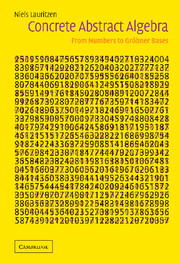1 - Numbers
Published online by Cambridge University Press: 05 June 2012
Summary
This chapter serves as an introduction to the modern theory of algebra through the natural numbers 0, 1, 2, …. The list of natural numbers never ends and most of them are far beyond everyday use. Gigantic numbers of more than 100 digits are used to protect information transmitted over the internet.
Suppose Alice has to send a message to Bob over the internet and it must be kept secret. Alice and Bob live far apart and many intermediate computers will see the message on its way. Alice will have to scramble (encrypt) the message and send it, but at the same time Bob will have to know how to unscramble (decrypt) it. How does Alice get this information through to him? She could call and tell him. But then again someone could be listening in on their phone call. Is there a way out of this problem?
The answer is an amazing “yes” and it builds on a current paradox of mathematics: the existence of so-called one-way functions f(X). These are functions easy to compute given the input X. Once they are computed and only f(X) is known, it appears to be exceedingly difficult to recover X unless some secret information is known.
Here is an example of a one-way function. Fix a natural number N and let f(X) = [X3], where [Y] denotes the remainder of Y after division by N.
- Type
- Chapter
- Information
- Concrete Abstract AlgebraFrom Numbers to Gröbner Bases, pp. 1 - 49Publisher: Cambridge University PressPrint publication year: 2003



